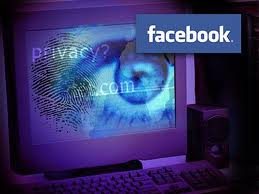Facebook Privacy and Security Info Graphic
Thanks to Naomi Paton from BestComputerScienceSchools.net for sharing this Facebook Privacy Infographic!
[youtube http://www.youtube.com/watch?v=LsezLe4l4fE&rel=0]
“Who is the bigger spy, the NSA or Google?”
I thought that was a really fascinating question. Of course, it comes because in the last couple of months the NSA has been outed by Edward Snowden, the former NSA employee. The NSA (National Security Agency) has been spying on our phone calls- who we’re calling and when, our emails- who we’re emailing and what about, and even our social media posts.
The latest scandal is called “Muscular”. Somehow, the NSA has gotten between the transmissions of Google and Yahoo. In other words, the NSA has been “sniffing” the emails going back and forth between the two largest email providers in the US and this has angered the tech giants like Google, Yahoo, and Facebook.
 What makes a privacy expert nervous? Glimpsing the size of the iceberg under the surface. When National Security Agency contractor Edward Snowden became a whistle blower earlier this year, I think we all knew we were really just seeing the tip of the iceberg about exactly how much information the NSA was gathering on the average American citizen. And it was a pretty large tip to start with.
What makes a privacy expert nervous? Glimpsing the size of the iceberg under the surface. When National Security Agency contractor Edward Snowden became a whistle blower earlier this year, I think we all knew we were really just seeing the tip of the iceberg about exactly how much information the NSA was gathering on the average American citizen. And it was a pretty large tip to start with.
Here’s a reminder of what started the whole thing. Snowden provided reporters at The Guardian and The Washington Post with top-secret documents detailing two NSA surveillance programs being carried out by the U.S. Government, all without the average voter’s knowledge. One gathers hundreds of millions of U.S. phone records and the second allows the government to access nine U.S. Internet companies to gather all domestic Internet usage (so they are tapping pieces of your phone calls and emails, in other words). The intent of each program respectively is to use meta-data (information about the numbers being called, length of call, etc., but not the conversation itself, as far as we know) to detect links to known terrorist targets abroad and to detect suspicious behavior (by monitoring emails, texts, social media posts, instant messaging, chat rooms, etc.) that begins overseas. As a privacy expert, I understand the need to detect connections among terrorists; the troubling part is the scope of the information being gathered.

Healthcare Organizations and the patients and clients they serve are among the highest risk groups to be affected by data breach, identity theft and privacy abuse. With the implementation of Healthcare Exchanges (Obamacare), and the electronification of patient records, the industry is wide open to scammers, fraudsters and criminals.
A simple Google search on the term data breach healthcare reveals hundreds of hospitals, doctor’s offices and medical facilities that have had their databases hacked, their patients’ and employees’ identities stolen and their organization’s private information and intellectual property compromised. Data theft is bad for customers, time consuming for the healthcare organization and a public relations nightmare for the industry. John Sileo knows the healthcare industry’s pain first hand, as he is generally the person contacted by the hospital after they have been breached.
National Public Radio and the Center for Investigative Reporting recently presented a four part series about privacy (online and off) called, Your Digital Trail. To get the gist of how little privacy you have as a result of the social media, credit cards and mobile technology you use, watch this accurate and eye-opening explanation of how you are constantly being tracked.
[youtube http://www.youtube.com/watch?v=bqWuioPHhz0]Marketers, data aggregators, advertisers, the government and even criminals have access to a vivid picture of who you are. NPR calls it your digital trail; for years, I’ve referred to it as your digital footprint. Let’s take quick look of what makes up your digital footprint.
 It seems I’ve spent a lot of time lately writing about the Surveillance Economy. This may be a strange expression to some, so I’ll define it as the use and exploitation of our location information derived from traffic surveillance cameras, new technologies like Google Glass and cell phone GPS tracking, among others. Recent topics we’ve covered include the NSA PRISM scandal, hacking Google Glass, Homeland Security’s seizures of electronic devices when crossing borders, and even drone use. Some of those may seem to be out there in a world that doesn’t affect us directly, but here’s one that hits very close to home for anyone who owns a vehicle.
It seems I’ve spent a lot of time lately writing about the Surveillance Economy. This may be a strange expression to some, so I’ll define it as the use and exploitation of our location information derived from traffic surveillance cameras, new technologies like Google Glass and cell phone GPS tracking, among others. Recent topics we’ve covered include the NSA PRISM scandal, hacking Google Glass, Homeland Security’s seizures of electronic devices when crossing borders, and even drone use. Some of those may seem to be out there in a world that doesn’t affect us directly, but here’s one that hits very close to home for anyone who owns a vehicle.
The American Civil Liberties Union released a report in July of 2013 entitled You Are Being Tracked that outlines the use of automatic license plate readers. These devices, which can be mounted on police cars or on objects like road signs or overpasses, use small, high-speed cameras to photograph thousands of plates per minute. They effectively collect and store information about not only vehicles of potential or known criminals, but everybody who drives a car!
[youtube http://www.youtube.com/watch?v=cB7_JLdayv4&rel=0]
I was asked recently by someone, “How do I delete my Facebook account?” Why would anyone want to do that? Perhaps because Facebook has announced that they are making more changes to their data use policy. This time, they are trying a trick that they have tried before and simply by using their software, you are agreeing to it.
Here’s what it is. They can take any of your photos- say a profile photo or pictures of your kids, and when you “like” a product, they can advertise your photo next to that product. In essence, this means you are endorsing those things you have liked in an advertisement.
So imagine your teenage daughter has a giggly sleepover with friends. They’re on Facebook and they see a Bacardi ad and to be cool your daughter “likes” it and then she likes the movie Magic Mike (even though she hasn’t even seen it), but now her name and her photos are associated with those two likes and is shared across her entire network.
So, why do people want to delete their Facebook accounts? Maybe because they’re tired of giving their privacy away, they’re tired of the arrogance of Facebook obviously making these changes for commercial profit purposes and they try to sell it to us as if it’s for the greater good of the user.
There is so much of our information out there that is not under our control. But social networks such as Facebook are under our control, so people want to take back control of the little privacy they have.
Now, I don’t want you to go out and take an emotional response and just cancel your Facebook account. As you will see in this episode, there is a right way to delete your account, and a wrong way. Choose wisely. I want you to think about it and take four steps:
(Watch the video to see exactly how to do all of these steps.)
 Is there such a thing as Facebook privacy? You’ve might have heard that Facebook is proposing a new Data Use Policy and Statement of Rights and Responsibilities (formerly known as a privacy policy). No one refers to it as a Privacy Policy anymore, because there is absolutely no sign of privacy left. And if you read the email from Facebook alerting you to the changes, or even the summary of changes that they provide, you are left with no clear idea of the magnitude of those alterations (you’d have to read the actual suggested changes).
Is there such a thing as Facebook privacy? You’ve might have heard that Facebook is proposing a new Data Use Policy and Statement of Rights and Responsibilities (formerly known as a privacy policy). No one refers to it as a Privacy Policy anymore, because there is absolutely no sign of privacy left. And if you read the email from Facebook alerting you to the changes, or even the summary of changes that they provide, you are left with no clear idea of the magnitude of those alterations (you’d have to read the actual suggested changes).
Facebook is masking privacy erosion with a deceptive executive summary. The latest changes make me very uncomfortable in three ways:
When Google released a trial version of its much-anticipated and much-hyped Augmented Reality lens (popularly known as Google Glass) to developers back in April, I wrote a blog on Google Glass Privacy. Now is a good time to check in and see what’s happened since the glasses have fallen into the hands of developers. By developers, I mean hackers (many of them of the good, or white-hat variety). Google gave Google Glasses to 1500 developer/hackers (well, sold them-for $1,500 to those who won an essay-based lottery). Brilliant move really, because these people are showing Google (and us, and future hackers) exactly what can, and will, happen when the mainstream public gets their hands on it. Here are some of the unintended uses of Google Glass: